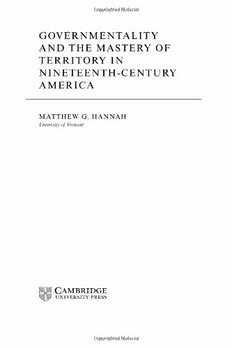
Governmentality and the Mastery of Territory in Nineteenth-century America PDF
262 Pages·2003·2.556 MB·English
Most books are stored in the elastic cloud where traffic is expensive. For this reason, we have a limit on daily download.
Preview Governmentality and the Mastery of Territory in Nineteenth-century America
Description:
Late nineteenth-century America was a time of industrialization and urbanization. Immigration was increasing and traditional hierarchies were being challenged. Combining empirical and theoretical material, Hannah explores the modernization of the American federal government during this period. Discussions of gender, race and colonial knowledge engage with Foucault's ideas on "governmentality." Through an analysis of the work of Francis A. Walker, a prominent political economist and educator of the time, the author demonstrates that the modernization of the American national state was a thoroughly spatial and explicitly geographical project.
See more
The list of books you might like
Most books are stored in the elastic cloud where traffic is expensive. For this reason, we have a limit on daily download.
